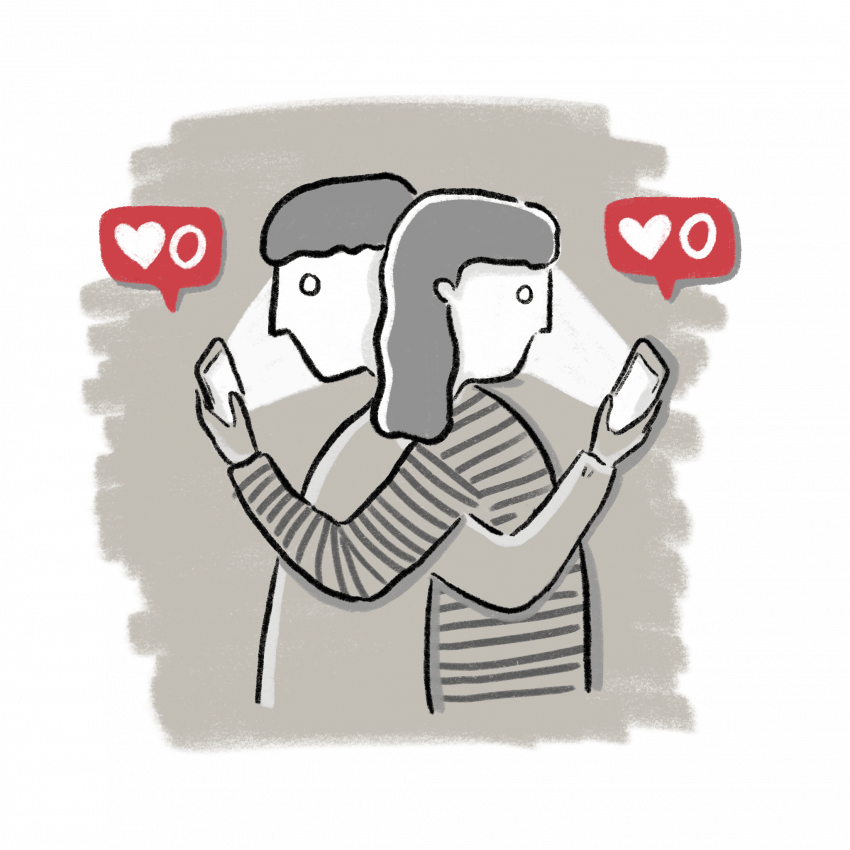
Planning to commit to an ice cream-fueled Insta-stalking session this Valentine’s Day? Kiana Thome, a fifth-year honours psychology student, is conducting a survey on the link between social media monitoring and romantic relationships that may stop you mid-scroll.
The study investigates how social media monitoring and jealousy influences psychological well-being by measuring relationship satisfaction and certainty. Thome says that what sets her research apart from past studies on the subject is the focus on the mental health of those doing the social media “creeping.”
“Other research hasn’t focused on how much it actually affects the person who’s doing the monitoring,” Thome said. “I incorporated a measure called the ‘happiness questionnaire,’ which looks at psychological well-
being. So my study focuses a lot more on how these factors can correlate with your emotional well-being.”
Thome and her honours supervisor, Sarah Knudson, predict a negative correlation between the two factors.
“My exploratory hypothesis is that individuals who score lower in psychological well-being will score higher in relationship uncertainty, social media jealousy and monitoring, but they will score lower in relationship satisfaction,” Thome said.
“If you’re not satisfied in your relationship, you’re probably already going to have some level of low well-being. And then if you have low well-being, you’ll probably have higher uncertainty in the relationship. You’ll probably be more easily jealous, specifically towards social media, and you’re probably going to monitor your partner more.”
Thome relates the study to the all-too-familiar “when you’re lurking and get you your feelings hurt” memes that plague the beginning of relationships.
“I came up with the idea because I was trying to find out who my partner’s exes were from their social media and being like, ‘Oh, were they pretty?’” Thome said. “It’s just a lot of information that’s so easily available that you get stuck going down a rabbit hole as soon as you start.”
Although newer relationships may experience more uncertainty and more social media monitoring, Thome says that even the most eternal flames can be affected.
“It’s still prominent in common-law relationships or relationships that have been three to five years long,” she said. “[They’re] still looking on social media, and [they’re] still saying, ‘Oh, you have a new friend and [they’re of] your preferred sex? Are you talking to them over Instagram? Are you friends on Facebook?’”
Thome believes the experience of channelling one’s inner detective to social-media “creep” on a significant other is a near-
universal experience for University of Saskatchewan students.
“This is so pertinent to the university population in romantic relationships right now because it’s just so accessible. Anything you’re ever wondering, you can just go and access,” Thome said.
To the U of S students ready to obsess over deleted pics until they end up five years deep down their partner’s second cousin’s dog’s masseuse’s LinkedIn, Thome suggests opting for communication rather than “creeping.”
“There’s research that suggests people are more satisfied when they’re aware of each other’s social media use. I think you should be able to be open with that person where you’re able to share what you post or who you’re talking to online,” Thome said.
“How you’re feeling in the relationship should take precedence. It’s a matter of making sure you’re comfortable and you’re happy.”
—
Jordana Lalonde
Graphic: Mỹ Anh Phan
Leave a Reply